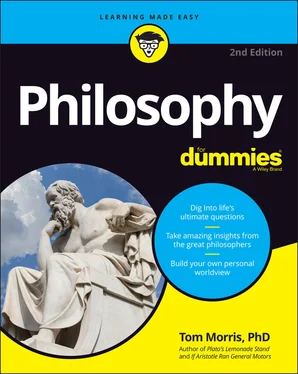Tom Morris - Philosophy For Dummies
Здесь есть возможность читать онлайн «Tom Morris - Philosophy For Dummies» — ознакомительный отрывок электронной книги совершенно бесплатно, а после прочтения отрывка купить полную версию. В некоторых случаях можно слушать аудио, скачать через торрент в формате fb2 и присутствует краткое содержание. Жанр: unrecognised, на английском языке. Описание произведения, (предисловие) а так же отзывы посетителей доступны на портале библиотеки ЛибКат.
- Название:Philosophy For Dummies
- Автор:
- Жанр:
- Год:неизвестен
- ISBN:нет данных
- Рейтинг книги:4 / 5. Голосов: 1
-
Избранное:Добавить в избранное
- Отзывы:
-
Ваша оценка:
- 80
- 1
- 2
- 3
- 4
- 5
Philosophy For Dummies: краткое содержание, описание и аннотация
Предлагаем к чтению аннотацию, описание, краткое содержание или предисловие (зависит от того, что написал сам автор книги «Philosophy For Dummies»). Если вы не нашли необходимую информацию о книге — напишите в комментариях, мы постараемся отыскать её.
Philosophy For Dummies
Philosophy For Dummies
Philosophy For Dummies — читать онлайн ознакомительный отрывок
Ниже представлен текст книги, разбитый по страницам. Система сохранения места последней прочитанной страницы, позволяет с удобством читать онлайн бесплатно книгу «Philosophy For Dummies», без необходимости каждый раз заново искать на чём Вы остановились. Поставьте закладку, и сможете в любой момент перейти на страницу, на которой закончили чтение.
Интервал:
Закладка:
Philosophers? Crazy! Philosophers? Otherworldly! Philosophers? Gloomy! When we hear the word, we tend to have a modern image come to mind of badly groomed academics, carelessly dressed in tweed sport coats, wrinkled shirts, badly rumpled pants, and old scuffed up shoes, who go through life coated with chalk dust, stroking their beards, bearing scowls on their faces and arcane thoughts in their heads, all the while writing on blackboards or whiteboards in capital letters such weighty words as “DEATH,” and “DESPAIR.”
In 1707, Jonathan Swift wrote the following comment:
The various opinions of philosophers have scattered through the world as many plagues of the mind as Pandora’s box did those of the body; only with this difference, that they have not left hope at the bottom.
In the century approaching our own era, the widely read American journalist and literary critic H.L. Mencken once went so far as to announce, “There is no record in human history of a happy philosopher.” (But, hey, he never met me.)
NOT EXACTLY FANS OF PHILOSOPHY
It is hard to find many general subjects that are as controversial among the well educated as philosophy. Not everybody is a fan. And that’s because not everyone really understands what it’s all about. The following quotes show what some prominent individuals have had to say about philosophy and philosophers, largely because they misunderstood the enterprise and what it aims to accomplish. It will help to hear this crowd of critics in order to get beyond their misapprehensions and dive deep into what philosophy really is.
Philosophy is such an impertinently litigious lady that a man had as good be engaged in lawsuits as have to do with her.
— Sir Isaac Newton
Wonder is the foundation of all philosophy, inquiry the progress, ignorance the end.
— Montaigne
Philosophy will clip an angel’s wings …
— John Keats
All philosophies, if you ride them home, are nonsense; but some are greater nonsense than others.
— Samuel Butler
Philosophy consists largely of one philosopher arguing that all the others are jackasses. He usually proves it, and I should add that he also usually proves that he is one himself.
— H.L. Mencken
If I wished to punish a province, I would have it governed by philosophers.
— Frederick the Great
There is only one thing that a philosopher can be relied on to do, and that is to contradict other philosophers.
— William James
When he who hears doesn’t know what he who speaks means, and when he who speaks doesn’t know what he himself means — that is philosophy.
— Voltaire
There is nothing so strange and so unbelievable that it has not been said by one philosopher or the other.
— Descartes (the strange and unbelievable father of modern philosophy)
I have tried, too, in my time to be a philosopher but, I don’t know how, cheerfulness was always breaking through.
— Oliver Edwards (18th century)
So what’s the deal here? Philosophy, done right, should be the opposite of all this gloom and doom stuff. It should be stimulating, exciting, liberating, provocative, revelatory, illuminating, helpful, and fun . Philosophers themselves should be great company, the life of any party, a hoot and a half. (Okay, maybe I’m getting a little carried away here.) Even Cicero, despite his occasional grumblings about the wilder philosophers of his day once proclaimed, “If wisdom be attainable, let us not only win but enjoy it.”
I must admit that I know of at least a few great thinkers I’m glad I don’t have as neighbors. And some of their books can be … well, should I say, “less than scintillating”? And, all right, as long as I’m trying to be as candid here as possible, I should be willing to acknowledge — without naming any names, of course — that I have actually met a few exceedingly peculiar social misfits who seem to be fish out of water in ordinary life, and whose only discernible accomplishment appears to be an academic doctoral degree in philosophy from a major university. Along with, perhaps, several unintelligible publications bearing their names. And, unfortunately, a teaching position that places them as ambassadors of philosophy in front of classrooms full of bewildered and yet sometimes bemused undergraduates. But things are not always what they seem. As the ancient poet Caecilius Statius once reminded us: “There is often wisdom under a shabby cloak.”
The enterprise of philosophy itself, philosophy as a genuine human activity, can and should be great. Not to mention the fact that philosophers can be our friends. They often enjoy being taken out to dinner, or for a celebratory libation or two. On this topic, I should perhaps quote the great poet John Milton, who wrote:
How charming is divine philosophy!
Not harsh, and crabbed as dull fools suppose,
But musical as is Apollo’s lute,
And a perpetual feast of nectar’d sweets,
Where no cruel surfeit reigns.
In other words, good stuff indeed.
The same Cicero who loudly voiced his irritation at bad philosophers didn’t shrink from praising a good one. He once described Socrates as “the first man to bring philosophy into the marketplace.” In many ways, it’s the example of Socrates that will be followed in this book. Philosophy can be brought back into the marketplace of ideas that are seriously contending for your attention. Some pretty lofty ideas can be pulled down to earth and examined for their amazing relevance to our day-to-day lives. The goal in this book is to help you get clearer on some of the issues that matter the most, but that you may ordinarily tend to think about the least.
I hope that together we can be explorers of the spirit, charting our way forward in new depths of awareness as we go. We take a close look at some exciting ideas, quite a few amazing questions, and several new perspectives for everything we think and do. We can’t nail down a definitive answer for every question that may arise, but if you stick with me for the duration, you’re likely to find yourself making more progress in appreciating and understanding these topics than you may at first imagine. I might sometimes ask some strange-sounding questions, but I promise you that, as you consider the answers, those queries can help you attain some pretty amazing perspectives on this life that we’re living. Our goal, throughout, is nothing less than a quest for wisdom itself. And that’s a vitally important matter, since, as the American philosopher Ralph Waldo Emerson realized, “Life is a festival only to the wise.”
Consulting Socrates on What Counts
The original public philosopher, Socrates liked to walk the streets and go to parties, along the way engaging anyone he could in philosophical dialogue. For him, philosophy was not a dry, intellectual subject, a game for pedants and scholars, but a requirement for living well. He even famously proclaimed the following axiom:
The unexamined life is not worth living.
But what in the world does this statement mean? Everyone knows what it means to say, “This car isn’t worth $80,000,” or “This shirt isn’t worth $150,” or “The tickets to this concert aren’t worth $125 each.” But what exactly does it mean to say about a certain form of life, a particular lifestyle — what Socrates is calling “the unexamined life” — that it’s “not worth living”?
Essentially, an item is “worth” what it costs if the value or benefits that you derive from it are equal to or greater than the price you pay for it — which is ultimately the same value as the underlying effort or energy that you put into obtaining the resources required to pay that price. Whenever I think about making a certain purchase, I always ask myself whether the item is truly worth the asking price: Is it worth that amount of money? Is it worth the work it took for me to earn that amount?
Читать дальшеИнтервал:
Закладка:
Похожие книги на «Philosophy For Dummies»
Представляем Вашему вниманию похожие книги на «Philosophy For Dummies» списком для выбора. Мы отобрали схожую по названию и смыслу литературу в надежде предоставить читателям больше вариантов отыскать новые, интересные, ещё непрочитанные произведения.
Обсуждение, отзывы о книге «Philosophy For Dummies» и просто собственные мнения читателей. Оставьте ваши комментарии, напишите, что Вы думаете о произведении, его смысле или главных героях. Укажите что конкретно понравилось, а что нет, и почему Вы так считаете.












